- Memories of Nicholas Schaffner and The Beatles Forever - January 4, 2026
- Old Draft: Beatles Folk Memory 1970-1995 - December 8, 2025
- Lights are back on. - December 8, 2025
Guest Dullblogger Chris Dingman has just written a very interesting and well-expressed post on Paul McCartney’s essential contribution to the Lennon/McCartney partnership, and you should probably read that before reading this. This post began as a comment to that post, but as I wrote I felt it ranged too widely, and touched on something too essential, not to be surfaced on its own.
It’s true that Paul was the more natural musician, and the Beatles were, after all, a band — but they were so much more than their music, just as Valentino was more than movies, and JFK was more than politics. Music was the means of expressing something much, much bigger. During the life of the Beatles (and even today) there was an unspoken, deeply felt psychological transaction taking place, and while the music was the occasion for that transaction and reinforced it tremendously, it wasn’t nearly the whole thing. It’s the difference between the glory of the Beatles as a concept, and the equal glory of the Beatles as a working band, that is at the heart of the endless John versus Paul debate. We all know that John’s lying when he says that the Beatles were “just a band that made it really really big.” And it’s Paul’s and Ringo’s post-Lennon embrace of the larger significance of the Beatles that makes them so beloved. They codify what we all knew.
There are a lot of really fine musicians in the world, but very few capture the world’s imagination. John Lennon’s personality was a perfect fit for his time, in a way Paul’s was not — Paul would’ve been successful at any time, but he wouldn’t have changed the world. As the BBC declared in 1969, John was a man of his decade, and once that moment was over, he was over. Whereas there would always be a place in the world for Paul. John knew that, and that’s at the heart of his post-68 ennui, and probably explains a lot of his rage at Paul, too.
“Whayadda got?”
We must remember that Paul’s musical gifts weren’t necessarily an advantage in the early days of rock and roll. Technical skill, virtuosity, melodic gift… these all existed in profusion before Elvis snarled onto the scene, wiping more musically gifted performers off it (Sinatra, for one; every jazz player ever, for another). What was being sold in the ten years before Beatlemania wasn’t music as much as an attitude, and I trot out this commonplace to remind that it’s John’s personality, not Paul’s, that satisfies the Brando-esque necessities of the early rock-and-roll icon. (This isn’t a slight against Paul; I don’t have it, either. I think one has to be broken in a very particular way for it to occur.)
But this burning fire comes at a price — young John is nobody you want to trust; the Beatles may have had to become “the biggest bastards on Earth” to make it, but is there any doubt that this came a bit more naturally to Lennon than the other three? I just watched “Streetcar Named Desire” for the first time, and Brando’s Stanley Kowalski is very Lennon-like — in his love of drink, his defiantly disordered life, his violence and tenderness, his cruelty and need. If you wanna know what John and Cyn were like, pre-Beatlemania, go watch Stanley and Stella.
John’s attitude is so strong that it makes you forget that he wasn’t born on the wrong side of the tracks. Young Paul could charm you; but young John would probably EAT you. John Lennon was very, very good at not giving a single solitary fuck, and that was necessary equipment for the leader of the Beatles. It was only after John had set an outrageous goal (“I want to be the most famous man in the world”) and then achieved it at an absurdly young age, that he grew lazy and careless, but we mustn’t let the old man’s decadence blind us to the young man’s ferocity. Post-acid, post-Yoko, John’s simply not the same person he was. He coasted for the rest of his life on what he’d achieved by age 26, and that’s why he was so goddamn sad. (And a lot nicer.)
It was only after the Beatles remade pop, that the type of skills Paul has in such abundance became a valuable commodity in rock and roll. Even if he hadn’t become a teacher, Paul without John would’ve been just as likely to write musicals or toil in the English equivalent of the Brill Building (whatever that was). Paul alone likely wouldn’t have changed the world, because one never gets the sense that young Paul really felt the world needed changing. Unlike a lot of people, Paul McCartney was not an angry young man, and it’s possible that the 1957-67 youthquake would’ve moved against a solo Paul, not for him. (As the later, post-1968 iteration did.)
John Lennon was desperate in a way Paul wasn’t, and isn’t, and we owe it to the man to recognize this, and see the sweat and stakes in it. It’s not romanticism that convinces me that desperation is a portion of genius. Following a dream is very, very hard; it consumes you and you must allow it to consume you, even though you feel every bite. John was absolutely willing to stand athwart the mainstream for as long as he could hold out; Paul was not. This is not a slam, it’s just a difference in personality. Shit, it’s probably a sign of Paul’s vastly greater mental health.
John had to envision a new world, because he simply didn’t fit into the old one. In this way he’s like so many artists and writers of his generation. Like John Osborne and Joe Orton, Mary Quant, Michael Caine, David Bailey, Peter Cook and Brian Epstein, John Lennon could not have thrived in any other historical moment; and when that moment had passed, didn’t thrive. Lennon in the 60s is a fierce fucking creature; in the 70s, he’s a doped-up bear being fed by tourists.
John was clearly the more natural leader, and that simply must not be underestimated. While we can push back against the Wennerian idea that John was the genius of the band and the rest won the lottery, we can’t lose sight of the fact that it was John, not Paul, who formed the group, and led the group, had the absurd idea that it could change the world (not just The Crickets, Part II). Young Paul imitates, because he’s gifted enough to do so; young John is only proficient enough to be himself, desperately. John attracted the similarly desperate Epstein, and closed the deal with him in Spain. Goldman may believe that John went to Spain with Brian to make sure he stayed the boss, but perhaps John did this because Paul wouldn’t — Paul sacrifice his sexual identity for the sake of the band? C’mon. That’s altogether too desperate.
But it was John and Brian’s vision for the band that turned it into The Beatles; and during the mania, it was the group’s wit and cheek and brashness — all John traits, not Paul ones — that were remarked upon. We can be Paul-boosters here, because his early contributions are less celebrated, more in the background, and his later ones were unfairly dismissed by a jealous Lennon and a cadre of rock assholes. But the fact remains that John Lennon was the engine that made the Beatles happen. Nobody else — not Paul or George or Ringo, or George Martin, all vastly more talented in the making of music — saw the future like John did, because none of them were as restless. They didn’t need to be. Paul’s contribution was that, once Lennon and Epstein had got them to the mountaintop — each man destroying himself in the process — they stayed there, and (mirable dictu!) continued to improve.
Without John Lennon, the Beatles wouldn’t have happened. Without Paul McCartney, they would’ve been circling the drain by ’66. How nice that we got both. And what a shame John and Brian had to be consumed by their effort; but most are consumed for less.

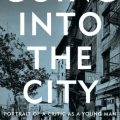
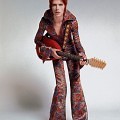
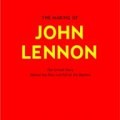
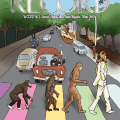
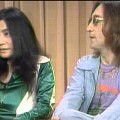
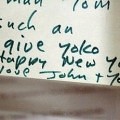
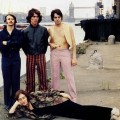
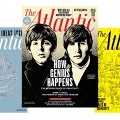
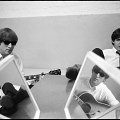
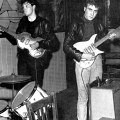
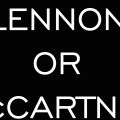
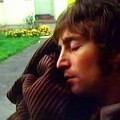
Both your and Chris’s posts are well-written, make a lot of well-reasoned, valid points and do a good job of discussing the strengths each one brought to the band while emphasizing how essential each one was to the Beatles chemistry. Crucially, both also manage to discuss the essential contributions of their respective Beatle without condemning the other half of the Lennon/McCartney partnership for not being more like their counterpart.
At the same time, because of way Beatles historiography has been written post-1970, I confess to finding the necessity of the posts disappointing. I have only been invested in Beatles fandom for five years, and in that time I have found the Lennon vs. McCartney division infinitely exhausting, frustrating, and obscuring. Your and Chris’s posts are the exception to the rule, but I believe this schism — and this belief, on the part of many Beatles authorities and fans, that they have to promote a particular Beatle at the expense of another, celebrating the strengths of one in part by condemning or devaluing the contributions of the other — has done a significant amount of damage to the accuracy of the band’s story. I want to reiterate that neither your post, nor Chris’s, does anything of the sort; they are reasoned, balanced and insightful. But Beatles historiography has been thrashing out the same Lennon vs. McCartney debate since 1970, to the overall detriment of a better understanding of the band’s story, both by encouraging partisanship and by narrowly focusing in on this topic to the exclusion of other, overlooked and far more soluble ones.
What both these posts reiterate to me is how complimentary the very differences so many people use to categorize and judge John and Paul were, and how impossible the partnership, let alone the Beatles, would have been without these differences. If Paul hadn’t been a diplomat, for example, capable of some more low-key leadership — If he had had John’s temper — the band would probably have disintegrated shortly before or after Hamburg and we never would have heard of them. If John had not been willing to be the first to jump off cliffs, Paul would not have followed, or possibly conceived of some of his own outrageous ideas. Faulting John for not being more like Paul, or Paul for not being more like John misses the entire point of the Lennon/McCartney partnership. Neither you nor Chris does this, but so, so many people already have, so many people continue to, and I am so tired of it.
@Ruth, as I’ve said many times, I think the similarities between John and Paul vastly outnumber (and outweigh) the differences. To me the more interesting discussion is how Lennon could be diplomatic, musical, charming — is there anything more charming than “rattle your jewelry”? — and how Paul could be hard-bitten, cynical, uncompromising. McCartney listened to other people’s records like an assassin (remember the moment where he walks into party playing “Jumpin’ Jack Flash” and puts down an acetate of “Hey Jude”).
The proper answer to “John or Paul,” to me, is always “John AND Paul.” That’s the only way to see either man truly clearly. But my purpose in posting was to underscore how in tune John Lennon was with one precise era — basically, 1957-70 — and how at sea he was before and after. McCartney’s genius is a musical one, whereas Lennon’s, to me, is one of timing and style. As you say, complementary. To see Lennon as a man of a moment explains a lot about him, with Paul and without him.
Your note about how intriguing John and Paul’s similarities were — and how essential those similarities were to who and what the Beatles were, and what they produced — is another issue that’s been overlooked because of the ingrained Lennon vs. McCartney reflex. In the 80’s, the idea that John and Paul had any similarities was anathema to writers who lionized John: according to Ray Coleman, “John and Paul never had much in common.” So many Beatles authorities seem much more comfortable cementing schisms and pigeonholing particular Beatles rather than examining the collective fission that made Lennon/McCartney what they were.
I agree with a lot of what you say here, Michael. There are good reasons Lennon is often singled out as the key artist of the decade (see the cover of Richard Avedon’s “Sixties,” for example). Without his anger and desperation, the Beatles wouldn’t have happened.
However, I don’t think saying that Lennon was “the engine that made the Beatles happen” is quite accurate; I think the Beatles were more like a chemical compound than like a car. Lennon and McCartney needed each other as catalysts, in particular — musically as well as personally. I recall that George Martin compared them to a vinaigrette.
Edited to add the part of Martin’s quote that I could find, in this BBC 2 article: “Martin has said that it is impossible to rank Lennon and McCartney’s respective contributions to the Beatles. ‘It’s like asking what’s the most important constituent in a sauce vinaigrette, the oil or the vinegar?'”
Of course this is true and Martin is right and so are you @Nancy. But I think that by the time George Martin enters the picture, much of Lennon’s essential work is done; the moment they entered Abbey Road, the game changed — it turned from a dream, an ideal, a vision of the future that Lennon was determined to will into being, into a reality that Paul, not John, was better-suited to make happen.
The very things that made John such a nightmare after India (his fundamental restlessness, his prizing of the new over everything, his craving to shock and differentiate himself) are what made him create the situation for Paul to thrive at the beginning.
Can you even imagine John tsking a straight job in 1961? I can’t. And it’s that level of kamikaze commitment that was necessary for Paul — a much more naturally cautious, less damaged person with more options — to reach his fullest potential.
Yeah, that makes sense. I think that’s what Chris is getting at when he says Lennon got McCartney to “jump the fence.”
Another thing that chimes with what you’re saying: the two alternative fiction books I’ve read that imagine a different Beatles story starting from the beginning (Shipper’s “Paperback Writer” and Kirwin’s “Liverpool Fantasy”) both have McCartney becoming a successful, albeit conventional, musician without the band and Lennon struggling to find a place in society.
The origin and dismissal of Martin’s “oil or the vinegar” quote is a demonstration of how toxic and obscuring the Lennon Vs. McCartney debate has been. Martin actually provided that quote to Ray Coleman, in the interviews he provided Coleman with for his 1985 biography of John. When Coleman asked Martin to identify which Beatle, Lennon or McCartney, deserved the greater share of credit for the Beatles genius, Martin responded by providing the “oil or the vinegar” quote. Coleman then promptly ignored Martin’s assessment and explicitly anointed John the band’s sole genius, a position he later retreated from in later editions of his bio of John, and then reversed himself on in his 1995 biography of Paul.
I find that I cannot discuss John’s contribution to the success of the Beatles without discussing Paul’s, and I cannot discuss Paul’s contribution to the success of the Beatles without discussing John’s. As Joshua Shenk wrote, “the shape of the Lennon-McCartney relationship was more like a spiral, the repetition of a certain pattern with ascending complexity. To be a strong pair, both members must be able to lead AND follow.”
Michael said it. It’s John and Paul, Paul and John. Otherwise, they would have had to drive their own engine in life. Where would they have ended up, who knows?
If they hadn’t joined together when they did, if there was never a such thing as The Beatles, we all PROBABLY would have never heard of John Lennon with all his angst, or Paul McCartney with all of his polite manners. BUT…if…big IF…there was never such a thing, an entity, that was The Beatles…and IF, there was even the remotest chance, that any of the guys we know as the Fab Four, were to somehow become (a) solo star(s) on his/their own, a famous person(s) all by himself/themselves, even to a lesser degree of fame, he would have had to have ambition, discipline, focus, drive, perseverance…and desire for fame. McCartney had/has these character traits in spades. Starkey certainly had/has discipline, perseverance, and tenacity. I may be wrong but IMHO, I don’t think Lennon nor Harrison had enough of these qualities all by themselves, or enough initiative on their own, to drive that engine toward low level fame.
@Waterfalls, this is what I’m getting at: John Lennon HAD to have all of the things you name in the early days for the Beatles to succeed. Certainly prior to 1964, the other three were deferring to him; and anything he didn’t want to do, they didn’t do.
If you buy that, and I do, because it’s pretty consistent throughout all the books, then Lennon had to have A massive amount of drive and persistence and discipline and desire for fame–at the beginning.
People are not static over time, and what I see with John Lennon is someone who worked his ass off to get what he thought he wanted, then succeeded beyond his wildest dreams, then found it wasn’t worth it to him. It didn’t solve the problems that he thought it would or should solve. A lot of what looks like laziness to us, or lassitude, not caring, losing himself in drugs, could simply be disillusionment. He needed to be famous for life to be worth living–that’s the difference between him and Paul.
But when being famous, more famous than he ever thought possible, didn’t make him feel better, he lost interest in the whole thing. And can we blame him?
Whether it’s 1961 or 64 or 71 or 84, Paul McCartney is basically the same dude. He’s easy to see, because he knows what he’s about, and he’s mentally stable. John is none of these things. He changes, seeks, contradicts himself. The old jaded embittered Lennon, the Lennon who’d been to the mountaintop and found it wasn’t all that, was not the same guy he was in 1958 or 61 or even 64.
We don’t have interviews with John Lennon circa 1961. Our portrait of John is going to be skewed towards his old, jaded, layabout self. But given what The band accomplished, and given the guy we know that Paul was, I feel fairly confident that Young John was ambitious as hell, driven as hell, and absolutely committed to doing everything he possibly could to be the most famous man in the world.
John Lennon HAD to have all of the things you name in the early days for the Beatles to succeed.
But the band needed Paul’s contributions just as much. Suggesting otherwise is like saying the person with the car is more important than the person with the gas. One would get nowhere without the contribution of the other.
Paul’s the one who demanded the band prioritize excellence over friendship. He’s the one who taught John guitar, wrote songs first, wrote little pieces about the band for their gigs, expanded their musical repertoire, etc. Paul supplied the gas. And John’s car would have gone nowhere without it.
@Karen, do you agree that John Lennon was the leader of the Beatles at the beginning of the group?
If you do agree, what does that mean to you?
If you don’t agree, why do you think everyone involved with the group From 1957 to the mania routinely called John Lennon the leader of the group? If this was not accurate, why would the others allow it? Why would Brian Epstein allow it? Why would Paul put up with that?
I do not know of a single instance of any of the other Beatles complaining over this characterization; quite the opposite, in fact. Paul has even spoken about how he prefers to be “second banana.”
Absolute equality between John and Paul prior to, say, revolver, is a fundamentally new reading of the group’s dynamic, and I would need some convincing on that.
That’s so funny MG–I was just about to edit my comment to include a comment about leadership.
Leadership, as we know, takes on many forms. I view John as having a charismatic/motivational leadership style. This type of leader keeps everyone motivated and confident. They’re the morale boosters. They make everyone feel inspired and ready to take on the world.
I view Paul as having a goal-focused, supportive leadership style. This type of leader keeps the goals obtainable and keeps the team on task. People with this leadership style are usually the ones who pipe up with a solution when everyone else is getting discouraged.
Charismatic leaders pull, while goal-focused leaders push. They often work as a team and do so very successfully, as long as they have common goals.
I think the charismatic leadership style is more easily recognized and is most often emulated. It makes sense, then, that John would be perceived as “the leader”–which indeed he was, but it was a function he shared with Paul, IMO.
This rings true to me, @Karen.
The other part of this is how the age gap between John and Paul functioned differently as they both aged. In 1960, it meant a lot; by 1966, it didn’t.
Definitely. And at the beginning, all they had was a few battered guitars and a dream. They would be heavily dependent on a charismatic leadership style to inspire them. Shenk describes the power dynamic in creative pairs this way:
“While it’s usually clear who has the upper hand in creative pairs, the leader-follower schism can’t be absolute. This is the paradox of power dynamics.”
You’ve mentioned the Shenk book a couple of times, Karen: were you planning on doing a review of it? I read and enjoyed it, and would be interested in your take on it.
Ha–I seem to have developed a case of Shenkmentionitis.
I was thinking that a review of his book would be really interesting, but also a little daunting. I’d also love to read your take on it as well.
Last August Mike, Devin, and I each wrote a post about the excerpt of Shenk’s book that was published in the Atlantic, but none of us reviewed the whole book.
I remember that Nancy. Do you think a book review would be redundant? I was thinking maybe more of a book summary, highlighting key concepts.
Karen, I’m sure your take would be different enough to make a post worthwhile. I look forward to hearing what you think!
Thanks Nancy–that would be a great discussion, I think.
Replying to my own comment, but wanted to add that there were a few exceptions to the general view that John was the leader.
There was someone whose name escapes me now, but he spent a good deal of time with them on one of their tours and based on the interactions he witnessed, came to the conclusion that Paul was the actual leader. John, he said, wouldn’t make a move without ensuring Paul had his back.
Regardless, I think the leadership function within the Lennon/McCartney team wasn’t as clearcut as one might think.
That’s a good point about Lennon’s disillusionment with what he set out to achieve, Mike. I wonder how much of Lennon’s anger at McCartney, in the late 60s, was about the fact that success and fame DID make Paul happy?
And in the early years, there’s no doubt that Lennon was the leader of the band. In a recent interview McCartney still names John as his “hero,” which says a lot.
I think that’s a lot of it, @Nancy. And I think that’s a lot of George’s resentment as well.
That makes sense to me, Mike — Paul and Ringo are, IMO, the band’s natural performers, the ones who love being on stage. From what I’ve read I think they were more often happy than not with being Beatles. It’s as if both Paul and Ringo were looking to the band to fill needs of theirs that a band COULD satisfy — while John and George were, perhaps, looking to it to satisfy needs a band couldn’t.
If that dynamic was real (and I’m not entirely convinced myself, still thinking this out), then Paul becoming the target of John’s and George’s dissatisfaction makes psychological sense. Ringo wasn’t perceived as a threat, or a reasonable target: but Paul was. I can imagine that it would have been irritating to be around someone for whom the Beatles’ success was everything it was cracked up to be.
Paul’s hero comment could be a reflection of his authentic experience, but it could also represent his need to bridge the perceived divide between he and John (“love me too because really, John and I were best mates”). And if we were to take his comment totally at face value–which I have no trouble doing, actually–that wouldn’t automatically cancel his own leadership function within the creative team. To do so would imply that leadership is a zero-sum game: if one has it, the other(s), by definition, cannot.
Maybe it’s all about which leadership function supplied the stronger fuel to propel the band forward. I tend to think that John’s jet fuel was a little more powerful than Paul’s unleaded gas, to use a goofy analogy. In that sense, I would have no quibble with the statement that John’s leadership was more vital, at least in the early days, for the band’s success.
Karen, I tend to think Paul is sincere when he identifies John as his hero. I suspect Paul loved John for doing things he couldn’t, or wouldn’t, do himself, and for pushing him beyond where he could ever have gotten on his own. And maybe that’s linked to the kind of desperate hunger/charisma/personal power that Lennon had.
I really do see the two of them as chemical elements that fused to produce something new. When they worked together, even towards the end, even when things were bad, they could be generous with each other’s work and bring out the best in it. I think of things like John’s “bye, bye” vocals on “She’s Leaving Home.” That’s not a song that he would have written, and it’s even one he might have dismissed as “granny music” in the late 60s/early 70s, but he adds exactly what that song needs. To me his “bye, byes” take that song to a different level.
Same with Paul’s work on “Come Together,” which we’ve discussed here before. Even when the breakup is underway, even on a song that is at least party Lennon self-mythologizing, Paul figured out that slowing the tempo and fattening up the bass would produce a greater song. And John was able to accept that from him.
Overall I think you’re right about Lennon and McCartney embodying different types of leadership, both of which were needed.
Definitely. I think they had a mutual admiration society going, in spite of John’s bluster and revisionist posturing in later years.
“I really do see the two of them as chemical elements that fused to produce something new.”
That is it Nancy. To me, they were DESTINED to meet. Destined to be what they were, to each other, to make write songs together, and make beautiful music at the time they did.
All four were caught up in each others destiny, and the world benefitted.
But even destiny can be a fragile thing. We know it can be thwarted, broken, torn asunder……because it was.
Reading these comments is like reading a really exciting book! I find myself going back and forth agreeing with well stated points of view, “Yes you’re right…of course you are too!”. Now I see that my two cents worth was overpriced at that. I was viewing ‘early’ John as if he was the ‘later’ (morass mind) John, which of course he wasn’t.
Another thought as I sip my morning coffee–leadership is related to, but different from, personal power. While leaders, by definition, have personal power, those with personal power aren’t necessarily leaders: that is, their actions don’t necessarily facilitate goal attainment.
I watched this John Lennon-Man of the Decade clip on Youtube a month ago and had a pretty strong reaction to it. I made a comment on Youtube and thought I repeat that comment here. It doesn’t quite match the tenor of the discussion here but it is a response to the John Lennon Man of the Decade video.
We have JohnandYoko, strolling along their massive estate, John in full guru mode, waxing philosophical about LSD use, not needing school beyond learning to read and write, and his and Yoko’s special love. Cut to violence by police on peaceful protesters.
There is something disturbingly odd, something very 1984 (the movie) with the confluence of images of peaceful protesters getting dragged and beaten, by armed police, and the audio/video of John and Yoko, comfortable in a luxury hotel suite, doing a Bed In for peace, talking to a disembodied voice on the phone, describing the beatings unarmed peaceful protesters were receiving that very moment, imploring, “what should they do?” John and Yoko literally phoning in their support with John advising those getting clobbered by armed thugs with badges, to “Sing Hare Krishna, and don’t move about if it aggravates the pig! Don’t get hassled by the cops and don’t play their game! I know it’s hard, you know”,(quotes lyrics from The Ballad Of John And Yoko) “Christ you know it ain’t easy, you know how hard it can be!” (looks, smiles at Yoko, she giggles) “But it’s hard, so what! Everything is hard”. And Yoko telling them, “And don’t worry if it works or not. Everything works if you believe in it…if you can’t have a beautiful time there, then don’t have it and stay at home in bed!”
STUNNINGLY CLUELESS!!!
No wonder they lost credibility with the anti war/peace movement. They were so out of touch with the reality of that moment. They were so comfortable in that luxury bed in that luxury hotel doing a Bed In For Peace, naive to what was happening even in that moment on the phone, it is amazing! Only with Lennon’s brutal murder in 1980 was his status as a peace activist restored.
That was my Youtube comment regarding the John Lennon-Man of the Decade video. Too harsh?
Great comment, @Waterfalls. You might be interested in this old post and thread on the same issue.
That really was the Sixties, you know? Privilege and rebellion, image and reality, the limitations of a politics based solely on sex and showbiz.
Thank you @ Michael G, for directing me to that excellent post.
Ditto what Mike said. I’ve always found their “peace activism” a not-so-veiled Yoko inspired attempt to gain some social capital on the backs of a legitimate movement.
OK, I just read through this post and all the comments. Great insights from all. I’ve thought a great deal about the leadership and membership dynamics of the group, as well… especially about John and Paul. I think I’ve concluded that a lot of that will forever remain mysterious to us. It’s not clear to me AT ALL that John was the leader “behind closed doors.” In public? Absolutely. I think that was important to him in a way that it wasn’t to Paul. And I think Paul was comfortable in allowing it. But the more I look at it, the more John seems like a figurehead. Which is not to diminish his contribution, but just… not to overestimate it either!
It is definitely true that Paul looked up to John in the early days. He says it flat out: ‘He was the big guy, I was the little guy. I GREW to be his equal.’ And I take that interpretation of Paul’s at face value. Paul was 18 months younger than John, which is a big deal when you’re a teenager. As you grow, it matters less and less.
The thing that trips me up, though, is that I’ve NEVER gotten the impression that John saw them this way. From John’s perspective, based on everything I’ve heard him say, he thought Paul was his equal from the get go. I’ve never heard John characterize Paul as his follower, or his apprentice or anything like that. All his quotes are to the effect of “we learned together” and such. (And this is from the same guy who ALWAYS had a gang of followers, and was acutely aware of it. Even went so far as to call George one of his early fanboys in 1980) If anything, it seems that John was slightly in awe of Paul, from Jump Street and continuing forever. Considering how effusive Paul is in his adoration for John, it’s almost mind-boggling how little that appears to have been internalized by John. That tells me that John always considered Paul his equal and perhaps even felt elevated by the association.
Now… none of that necessarily contradicts the point of your post, Michael. If all of John’s leadership is in the public realm, than it’s all that really matters to the public. Right? However, if John is driving the Beatles, we can’t discount the importance of Paul driving John.
Over the course of these threads I’ve become convinced that we’re talking about TYPES of leadership, as Karen said. Here’s my take at this point:
John was the charismatic, inspiring, hellbent visionary who was indispensable for kicking things off, and who remained important as the center the others rallied around. He was hellbent while getting to the top, but once the group got there, I don’t think he had a vision of what to do next. Hence, perhaps, the importance of Yoko in the late 60s, who seemed to offer him a new vision to pursue.
Paul was the more realistic, hard working, even-keeled, and diplomatic part of the partnership, without whom the band would never have come close to achieving what it did. He knew how to get things done, as when he saw the need for George in the band and talked John around to it. And I’d argue that he had at least as much musical genius as John. But (and again, I say this as a big McCartney fan), he wasn’t the type to have an original vision and pursue it at all costs — probably at least partly because, as Mike suggests, he wasn’t as damaged and desperate.
YES.
John pointed in the distance and said “OVER THERE!” Paul replied “Great! I’ll get my map.”
. . . and pack the picnic basket, blankets, and extra guitar strings. Paul was clearly the “mom” of the Beatles, IMO.
haha–he was so much that.
And George and Ringo were the “kids”
Obla-di Obla-da! Life goes on bra!
“He was hellbent while getting to the top, but once the group got there, I don’t think he had a vision of what to do next.”
THIS.
Question: Was John “Little Lamb Dragonfly” ?
I have no answer for you little lamb
I can help you out, but I cannot help you in
Sometimes you think that life is hard
And this is only one of them
My heart is breaking for you little lamb
I can help you out but we may never meet again
Dragonfly, fly by my window
You and I still have a way to go
Don’t know why you hang around my door
I don’t live here any more
Since you’ve gone I never know
I go on, but I miss you so
Dragonfly don’t keep me waiting
I’m waiting can’t you see me I’m waiting
When we try we’ll have a way to go
Dragonfly you’ve been away too long
How did two rights make a wrong
Since you’ve gone I never know I go on
I miss you so in my heart
I feel the pain keeps coming back again
Dragonfly, fly by my window
I’m flying can’t you see me I’m flying
You and I can find a way to see
Dragonfly the years ahead will show
How little we really know
Since you’ve gone it’s never right they go on
The lonely nights, come on home
And make it right
My heart is aching for you little lamb
I can help you out but I cannot help you in
Sam, my answer is “probably, at least partially.” My sense is that, more than Lennon’s, McCartney’s lyrics tend to be about a mix of things. That’s one of the reasons they can be hard to parse. In this case I hear “come on home / And make it right” and think of “Fine Line” from the much later “Chaos and Creation in the Backyard”: “Come home brother / All is forgiven / We all cried when you were driven away.” And I also hear “Since you’ve gone it’s never right they go on / The lonely nights” and think of “No more lonely nights.”
I think McCartney defaults to traditional romantic imagery even when the emotions were more complex and not conventionally romantic.
“My sense is that, more than Lennon’s, McCartney’s lyrics tend to be about a mix of things. ”
Definitely agree with this. I can think of several off the top of my head: Hey Jude, Two of Us, Let it Be, Dear Boy, This One… etc.
BTW… Two of Us seems to be the one song that no one (even the Lennon-McCartney haters) believes Paul wrote for Linda and everyone assumes is all about John. But I think it’s about both of them; I think Paul gives them alternate verses (and the bridge to John). But Linda is very present in that song. IMHO, the song is actually about the transfer of “marriage” (or whatever) from John to Linda. ‘this is what we had… this is what WE have now’
“I think McCartney defaults to traditional romantic imagery even when the emotions were more complex and not conventionally romantic.”
Not sure I agree with this. 🙂 For example, Fine Line doesn’t sound romantic at all to me. Little Lamb sounds wistful/painful rather than romantic. Whereas No More Lonely Nights sounds romantic to me. YMMV, but I think Paul is very specific with the tone of his emotions.
I don’t think he does it all the time ~ I need to think more about how often I believe he does.
Having thought about this a bit, I definitely overstated things in my earlier comment. What I really mean is more like a continuation of my point about McCartney’s lyrics often being about a mix of things. Chelsea, your explication of “The Two of Us,” which makes sense to me, is a good example.
“Yesterday” is probably the clearest example of what I mean about McCartney’s crafting a song that can be read as romantic, even though the emotional impulse behind the song doesn’t seem to have been romantic. The song seems to be, in his own later-expressed view, about the loss of his mother. But the words can and have been read as the loss of a lover. In this case I see McCartney employing a traditionally “readable” form as a vehicle for a more ambiguous or difficult for him to express emotion.
And “We Can Work It Out” I think is partly about his troubles with Jane Asher and partly about his partnership with John. “Hey Jude” seems to be partly about Julian, partly about John, and partly about Paul himself. And so on.
So I guess what I’m really saying is that I think his songs are often about multiple subjects — even when the lyrics might sound straightforward, as “Yesterday”‘s might.
In the part of my earlier comment where I refer to how I hear lines from “Fine Line” and “No More Lonely Nights” chiming with lines from “Little Lamb Dragonfly,” I was thinking about the way McCartney’s songs seem to talk to each other sometimes — a different way that they can be about more than one thing, IMO.
I think it’s precisely this mixing multiple topics within a song that makes Paul’s lyrics feel baggy sometimes. Done well it’s great, nobody has a problem with the lyrics to hey Jude,but done poorly it feels imprecise and sloppy–why people take the work of this master craftsman and dismiss it as moon-June stuff, in a way that they never would with Lennon. (Who was laser-like in this regard. Almost to a claustrophobic degree. )
I can believe that, Michael.
OK, Nancy, very well put! Totally get what you’re saying now. And Yesterday is a great example. So… agreed.
“For example, Fine Line doesn’t sound romantic at all to me.”
—
That’s because it isn’t a romantic song. Fine Line is a song Paul wrote about his then-estranged son, James, who had left the family (not just Paul but was estranged from his sisters, too). “Come home brother, all is forgiven, we all cried when you were driven away” is a message to James.
At 6:07 John mentions his relationship with Yoko, that he has to work on his relationship with her and that it’s very hard and that they have, “…the gift of love, but it’s like a precious plant, you know, you can’t just accept it and leave it in a cupboard, or just think it’s going to get on with itself, or like a pet, you know (cocks his head, waggles his brows, grins, looks directly at camera and pointedly adds)”DESMOND!” He laughs and and finishes his thought about about how you have to nuture and take care of that precious love. I couldn’t help but think that he was talking about himself and Paul, and Paul directly when he said “Desmond!”
In the song Obla-di Obla-da,, the story about a married couple, Desmond and Molly Jones with their two kids, (I thought was metaphorically The Beatles, Dad John, Mom Paul, the two kids George and Ringo) but Desmond would be the Dad, so am I reading too much into this, or isn’t it just as likely that John and Paul would switch Mom and Dad roles? Does anyone else gets the sense that John is talking to someone specific (like Paul) when he says “Desmond!” or am I just a lone nut conspiracy theorist?
@Nancy: I recall that George Martin compared them to a vinaigrette.
.
Edited to add the part of Martin’s quote that I could find, in this BBC 2 article: “Martin has said that it is impossible to rank Lennon and McCartney’s respective contributions to the Beatles. ‘It’s like asking what’s the most important constituent in a sauce vinaigrette, the oil or the vinegar?’”
.
I always loved that quote from Martin. The contrast is what made it so special. But was he also giving his assessment of them as solo artists, as well? Peanut butter and jelly are perfect together, but they are just fine on their own. Oil and vinegar, not so much.
@Sam: “Question: Was John “Little Lamb Dragonfly” ?
.
I have no answer for you little lamb
I can help you out, but I cannot help you in…”
.
I always thought so. No answer for John in the press, perhaps. He always makes a point even to this day that he never answered John’s post-breakup statements in the papers. Not quite true, but he didn’t feel comfortable doing so. The second line reminds me of John’s performance of Revolution where he goes, “You can count me out– in.” Probably not. I love his inverse of the expression “two wrongs don’t make a right”. Yeah, definitely about John in my view. It’s a beautiful song that’s kind of overlooked.